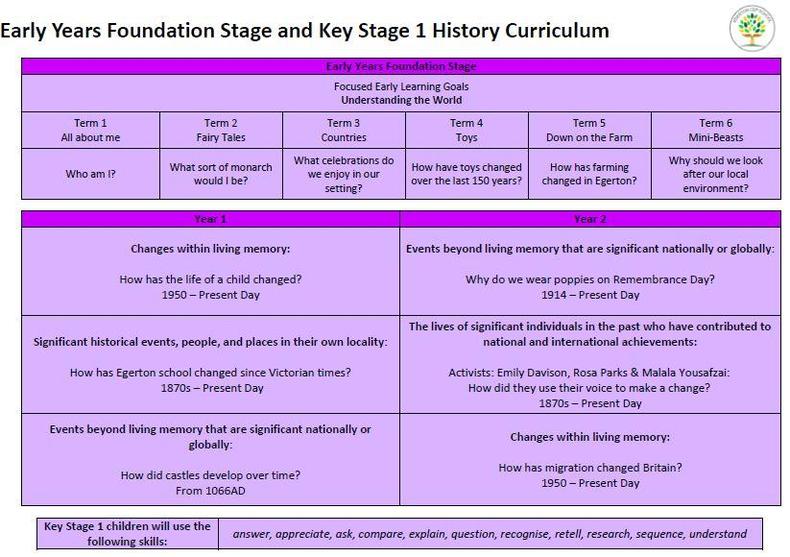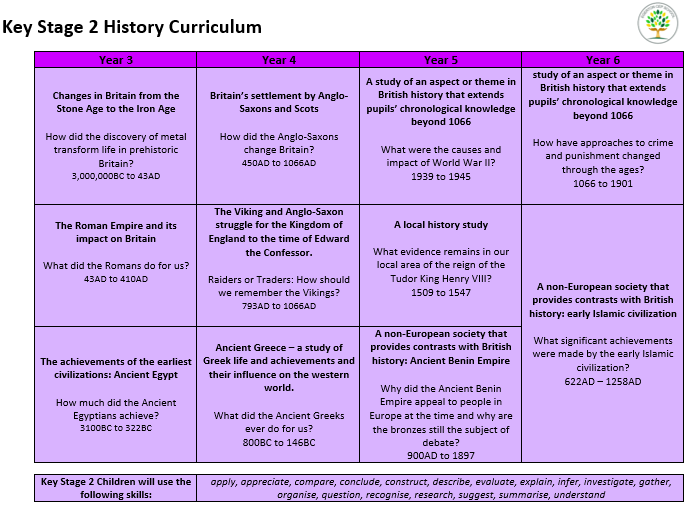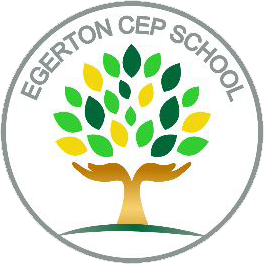History
What is History?
Roman 15:14 of the Bible
"For whatever was written in earlier times was written for our instruction, so that through perseverance and the encouragement of the Scriptures we might have hope."
History is the study of the past and historians attempts to understand it through research, study and explanations. History teaches us what it means to be human, highlighting the great achievements and disastrous errors of the human race. By understanding where we have come from, we can better understand who we are. With each generation adding its own chapters to history while reinterpreting and finding new things in those chapters already written, history helps us understand the way things were, the ways things are and provide us with the means to consider how we might approach the future.
Intent
Our History curriculum will provide children with the understanding that the society, in which we live, has been shaped by developments in the past. Children will study key individuals, events and movements that have influenced Egerton, Kent and the UK as well as non-European and early civilizations, paying attention to invasions, raids and attacks that have transformed societies and shaped the way we live today.
Children will gain knowledge about the past by thinking critically about historical source material, developing questions to help make sense of what has happened and piecing together information in order to construct informed responses and make links to understand the relevance for the present day and the future. Children will apply historical enquiry skills to enable them to confidently communicate their findings and historical understanding to a range of audiences.
Through high quality teaching, we develop the following essential characteristics of historians:
- Reflect upon and think critically how the past influences the present and the short and long term implications caused by past events.
- Appreciate past achievements as well as ‘mistakes’ of mankind in the past.
- To have an excellent knowledge of the chronological order of key events and when societies existed as well as being able to place these on a timeline dated up to the present day.
- To name significant events within in history and understand the causes and consequences of events that have happened.
- To gain a sense of identity and an increased understanding of children’s own position within the Egerton community, their role within society and the world.
- To appreciate and respect other cultures, ideas and traditions that are not our own and to recognise them as meaningful products of specific times and places.
- To be able to apply analytical skills with growing accuracy to express well-balanced opinions and to aid decision-making and judgments rooted in very good knowledge and understanding about issues in the past and in current society.
- To recognise that learning about history enables links to be made with other subjects across the curriculum including geography, RE and science.
- An extensive base of historical knowledge and vocabulary;
- The ability to utilise historical enquiry skills to find out about the past, explaining what happened and reach clear conclusions and explain their findings;
- A genuine interest in the subject and a real sense of fascination about events and people from the past.
Implementation
History is sometimes used as a topic focus for the half term as a key topic (as is geography) but we also aim to ensure that it is integrated into other areas of the curriculum and the basic skills are taught throughout the year through cross curricular work.
Our History curriculum aims to enable children to develop their skills as historians as they investigate, examine, question and reach conclusions about the past. Each unit of work will begin with an enquiry question which children will be encouraged to answer through an investigative approach at the end of the unit. The History curriculum is planned so that there are opportunities for cross curricular links to be made to ensure the children have occasions where by they can apply their knowledge and understanding.
Reading is central to our curriculum and reading historical texts is key to gaining an understanding of the past and its implications for the future. Children have access to a wide variety of subject specific fiction and non-fiction books to support their history learning.
Local heritage and cultural links have also been planned explicitly. English, Maths and ICT skills are taught during discrete lessons but are revisited in History so children can apply and embed the skills they have learnt in a purposeful context.
The programmes of study are carefully planned and delivered showing progression, enabling our pupils to develop their own historical skills and knowledge which can then be transferred to other curriculum areas.
Lessons will allow the practical development of skills such as examining primary and secondary sources of evidence including studying pictures, photographs, artefacts, diaries and interviews to draw conclusions and allowing children to present their findings and ideas.
We plan visits and visitors to provide first-hand experiences for the children to support and develop their learning. We recognise that to have impact the visits must be clearly linked to historical knowledge to be acquired and provide the opportunity for children to better understand the knowledge or apply skills.
Impact
- Opportunities for children to understand and apply the key skills of chronological understanding, gain knowledge and understanding of events in the past, interpret historical events and organise and communicate findings appropriately.
- There will be a clear progression of skills across EYFS, Key Stage 1 and 2 that builds on prior knowledge that can be demonstrated in writing books and class floor books and shows good or better progress in history from their starting points.
- Children will develop their practical and historical enquiry skills.
- Children will gain an understanding of the present in the context of the past.
- Children will develop a sense of identity through their knowledge and learning about the past.
- Children will learn lessons from history to influence the decisions they make in their lives in the future.
- Children will have a good understanding of key historical vocabulary.
- Our children will be confident historians and be able to clearly discuss their learning from past and current topics, as well as explain their next steps
- Out-of-class opportunities ensure skills learnt in history are ongoing and embedded as part of the Egerton ethos, for example encouraging children to questioning sources of evidence and justify their ideas accordingly.
- Continued training and support for teachers ensuring they are the experts in the subjects that they teach.
History Curriculum


